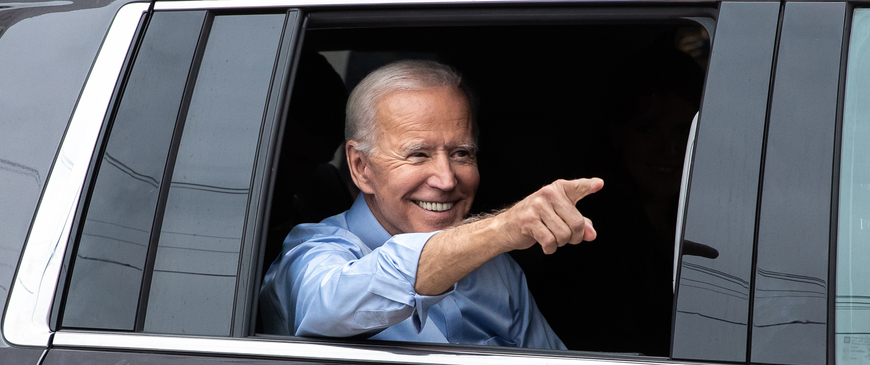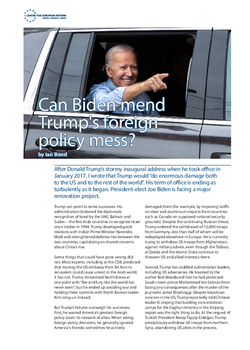
Can Biden mend Trump's foreign policy mess?
Donald Trump’s foreign policy failures far outweigh his successes. America’s allies may have exaggerated expectations of what Joe Biden can do to put things back on an even keel.
After Donald Trump’s stormy inaugural address when he took office in January 2017, I wrote that Trump would “do enormous damage both to the US and to the rest of the world”. His term of office is ending as turbulently as it began. President-elect Joe Biden is facing a major renovation project.
Trump can point to some successes. His administration brokered the diplomatic recognition of Israel by the UAE, Bahrain and Sudan – the first Arab countries to recognise Israel since Jordan in 1994. Trump developed good relations with Indian Prime Minister Narendra Modi and strengthened defence ties between the two countries, capitalising on shared concerns about China’s rise.
Some things that could have gone wrong did not. Most experts, including at the CER, predicted that moving the US embassy from Tel Aviv to Jerusalem could cause unrest in the Arab world; it has not. Trump threatened North Korea at one point with “fire and fury like the world has never seen”; but he ended up avoiding war and holding three summits with North Korean leader Kim Jong-un instead.
But Trump’s failures outweigh his successes. First, he wasted America’s greatest foreign policy asset: its network of allies. When taking foreign policy decisions, he generally ignored America's friends; sometimes he actively damaged them (for example, by imposing tariffs on steel and aluminium imports from countries such as Canada on supposed national security grounds). Despite the continuing Russian threat, Trump ordered the withdrawal of 12,000 troops from Germany, less than half of whom will be redeployed elsewhere in Europe. He is currently trying to withdraw US troops from Afghanistan, against military advice, even though the Taliban, al Qaeda and the Islamic State continue to threaten US and allied interests there.
Trump wasted America’s greatest foreign policy asset: its network of allies.
Second, Trump has coddled authoritarian leaders, including US adversaries. He boasted to the author Bob Woodward that he had protected Saudi crown prince Mohammed bin Salman from facing any consequences after the murder of the journalist Jamal Khashoggi. Despite bipartisan concern in the US, Trump reportedly told Chinese leader Xi Jinping that building concentration camps for the Uyghur minority in the Xinjiang region was the right thing to do. At the request of Turkish President Recep Tayyip Erdoğan, Trump precipitously withdrew US troops from northern Syria, abandoning US allies in the process.
Trump has consistently deferred to Vladimir Putin. Russia’s interference in the 2016 US election went unpunished. Though the US imposed additional sanctions on Russia during Trump’s term, Trump himself criticised Russia only rarely. In 2019, complaining of Russian non-compliance, he withdrew from the 1987 Intermediate-Range Nuclear Forces (INF) Treaty, which eliminated US and Soviet/Russian ground-based medium range missiles. But Russia is now free to deploy as many of these nuclear systems as it wants, unconstrained by the treaty. In 2020 Trump withdrew from the Open Skies treaty, a 1992 agreement involving 35 European and North American states that allows its members to overfly each other’s territory in aircraft equipped with cameras, infra-red scanners, radar and other sensors; if Russia follows Trump in withdrawing from the agreement, US allies in Europe will lose useful insights into Russian military activity.
Third, Trump has rejected multilateral approaches to solving international challenges, seeing them as intrinsically disadvantageous to the US. He has undermined the World Trade Organisation, preventing the proper operation of its dispute settlement mechanism and forcing other countries to find work-arounds. In 2017, he announced that the US would withdraw from the Paris climate change agreement – which it did on November 4th 2020, the day after the US presidential election. Trump claimed that the agreement was “a massive redistribution of United States wealth to other countries” and criticised the influence that it would give other countries over US economic policy – ignoring the fact that any obligations would be mutual. In the midst of the COVID-19 pandemic he has withdrawn from the World Health Organisation, regarding it as excessively influenced by China, rather than working through it to counter the crisis.
Trump also pulled out of the Joint Comprehensive Plan of Action (JCPOA), the 2015 agreement between Iran and China, France, Germany, Russia, the UK and the US to constrain Iran’s nuclear weapons programme. He imposed unilateral sanctions on Tehran instead, arguing that he could get a better deal than Barack Obama, both in terms of stopping Iran’s nuclear and missile programmes and frustrating its aspirations to become a regional hegemon in the Middle East. But the US is now at odds with the other JCPOA signatories, and Iran has lost its main incentive to comply with the deal – namely the economic benefit of getting sanctions lifted. It has expanded its nuclear activities, bringing it closer to having a nuclear weapons capability. Meanwhile, the reduction of US forces in the Middle East has increased Iran’s relative power in the region.
For a president supposedly determined to stand up to China, Trump’s unilateralism has often served Beijing’s interests. When Trump withdrew from the 12-nation Trans-Pacific Partnership (TPP) free trade deal in 2017, he lost the opportunity to create a huge economic space following US standards. He thereby handed the initiative to China – which has just signed the Regional Comprehensive Economic Partnership free trade deal with 14 Asia-Pacific countries, including seven of the original TPP countries.
In four years, Trump has shown that ‘America first’ is no basis for a superpower’s foreign policy strategy. Indeed, he has had no strategy: he has been an unreliable ally (as the Syrian Kurds discovered, to their cost) and an inconsistent adversary (whose relationship with Kim Jong-un went from “fire and fury” to “we fell in love”). Trump’s legacy is a world in which America and its allies are weaker and its adversaries are stronger than in 2017.
In four years, Trump has shown that ‘America First’ is no basis for a superpower’s foreign policy strategy.
According to opinion polling by the Pew Research Center, the number of people globally taking a favourable view of the US has fallen dramatically since Obama left office: it is at its lowest ever level in Australia, Canada, Japan and the UK. In the past, America’s reputation has recovered quickly from such dips when a new president took office. But in Trump’s lengthy refusal to concede defeat to Joe Biden the world sees a dysfunctional US, not a country with strong institutions and the rule of law. Big powers will be tempted to take advantage of US domestic paralysis; smaller countries will seek better relations with the rising powers as a hedge against US decline. If Biden cannot get a grip on the COVID-19 pandemic, or if Republicans, having ignored Trump’s exploding budget deficit, now insist on austerity and block Biden’s agenda, then the US will suffer lasting economic and political damage. In that case, voters could blame Biden and vote in another Trump-like candidate in 2025.
The US’s democratic partners are looking forward to Biden’s steady, consensual approach to foreign policy. But some of the damage Trump has done will take more than one presidential term to fix – if it can be fixed at all. For Europeans, the US remains an indispensable ally, but it may not be able to fill that role forever. European leaders would be well-advised to do what they can to help rebuild transatlantic ties and their populations’ trust in the US; but they should also intensify their preparations for future storms.
Ian Bond is director of foreign policy at the Centre for European Reform.

